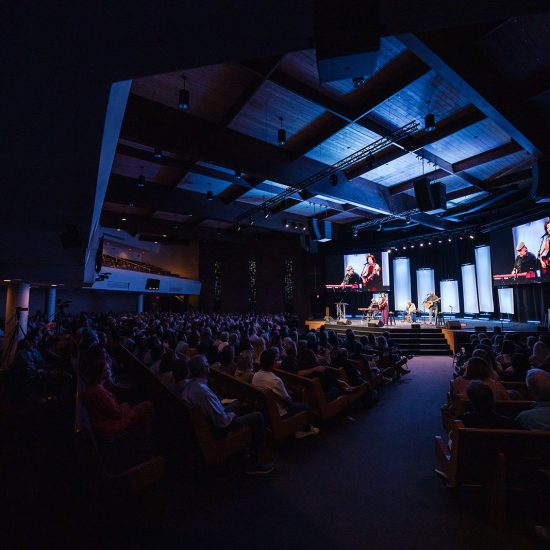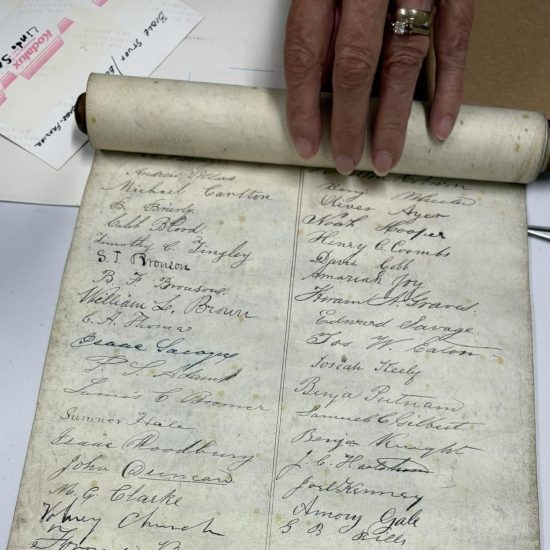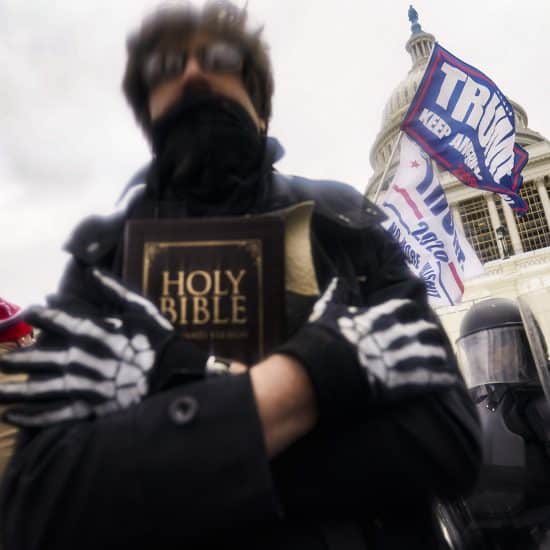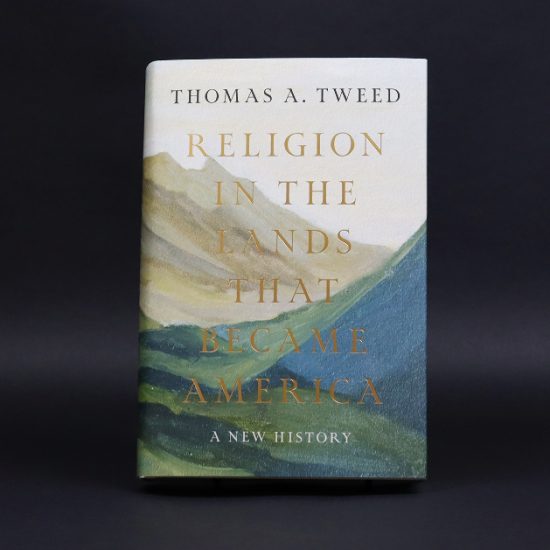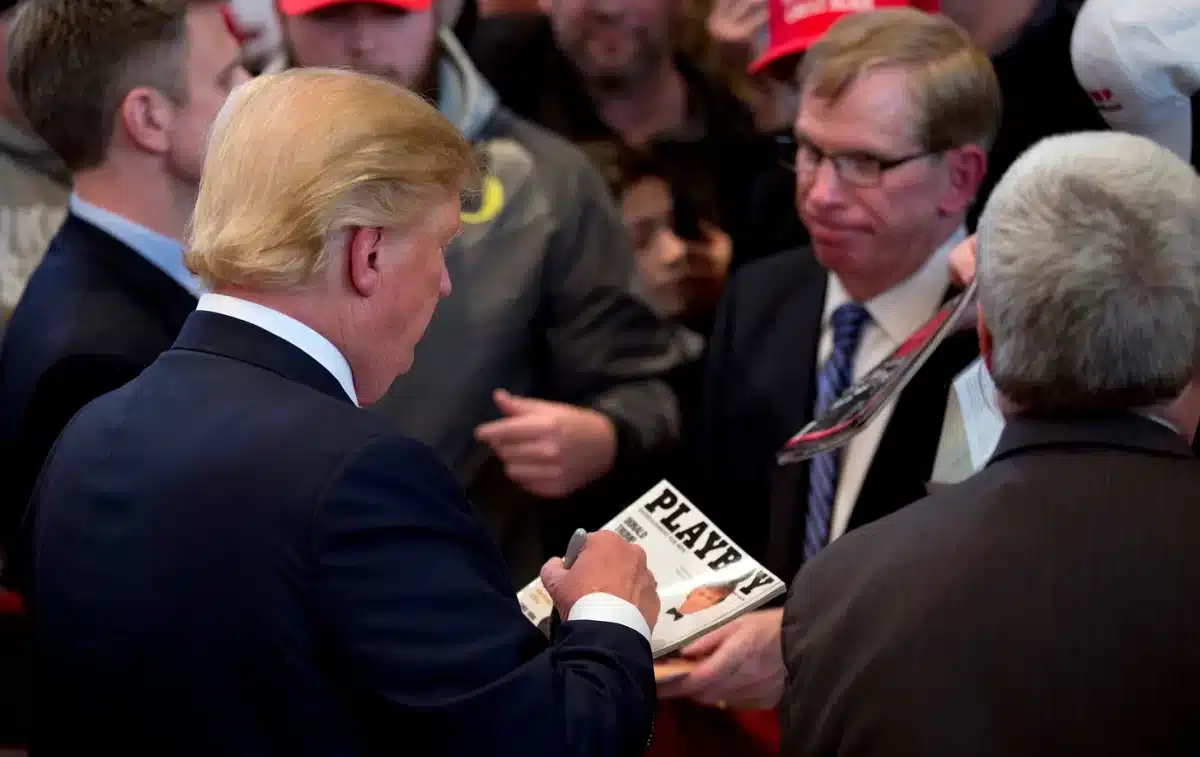
(RNS) — A new survey finds that majorities of all major U.S. religious groups believe actions by former President Donald Trump detailed in a recent hush money trial were immoral, but views are more split on whether he broke the law.

Donald Trump signs the cover of a Playboy magazine that featured him on the cover during a campaign event at a Christian college in Pella, Iowa, on Jan. 23, 2016. (Mary Altaffer/Associated Press)
It also remains unclear whether Trump’s new status as a convicted felon has helped or hurt his campaign to retake the White House.
The 19th News/SurveyMonkey poll, which includes religion-related data provided to Religion News Service, was conducted online May 30-31 among a national sample of 5,893 U.S. adults, drawn from more than 2 million people who take surveys on the SurveyMonkey platform daily. (The margin of error overall is plus or minus 1.5 percentage points.)
It polled Americans immediately after Trump was convicted last week on all 34 felony counts of falsifying business records. The case centered on $130,000 in hush money payments meant to silence adult film star Stormy Daniels regarding what she described as a sexual encounter she had with the then-businessman, a scandal that threatened to derail Trump’s 2016 campaign.
Asked about Trump, now the first former president in U.S. history to be a convicted felon, 61% of Protestants — which SurveyMonkey defines broadly, without delineating between mainline Christians and evangelical Christians — said they believe the actions detailed in the trial were morally wrong, with only 35% contending the opposite. The breakdown was similar among Catholics (63% vs. 33%) and members of The Church of Jesus Christ of Latter-day Saints (59% vs. 40%).
Jewish Americans were more likely to say Trump’s actions were immoral (73%), as were atheists and agnostics (88%) and those claiming “nothing in particular” (72%).
But religious groups answered differently when asked their opinion on whether Trump broke the law. Protestants were split, with less than half, 48%, saying his actions were a crime, compared to 49% who said otherwise. Most Catholics (54%) and Jews (66%) said they believed Trump broke the law, as did atheists and agnostics (86%) and those in the “nothing in particular” category (63%).
Meanwhile, most (57%) members of The Church of Jesus Christ of Latter-day Saints said they did not believe Trump committed a crime, with only 39% agreeing with jurors that he broke the law.
As to whether the outcome of the trial shifted any votes among religious groups, the poll is less clear. Taken together, the results show that most religious groups were not swayed to vote differently as a result of the trial. Shifts among Protestants and Catholics to and from support for Trump or President Joe Biden all fell within the poll’s margin of error.
There were some small exceptions: 5% of Jewish voters, a group that historically has voted for Democrats by large margins, shifted toward Trump, while 4% of those classified as “other” religions shifted away from him.
The most visible shift was among members of The Church of Jesus Christ of Latter-day Saints: 13% were convinced by Trump’s conviction to change their vote not to either major candidate but to an undetermined “other change” that would include undecided voters, those who do not intend to vote and those who plan to choose a third-party candidate.
Trump has long been bolstered by ironclad support from White evangelical Christians in particular, who backed him by large percentages in both 2016 and 2020. Any weakening of his support within that group may trigger a robust response from his campaign. But White evangelicals have also long been unmoved by his various scandals and are often his greatest defenders during times of trouble: When Trump triggered backlash in 2017 after blaming “both sides” for deadly racist violence that erupted in Charlottesville, Virginia, then-Liberty University President Jerry Falwell Jr. praised the president’s rhetoric as “bold” and “truthful.”
Biden, meanwhile, has already begun referring to Trump as a “convicted felon” in speeches and recently told Democratic donors that his predecessor “snapped” after losing the 2020 presidential election.

